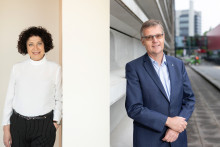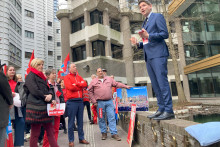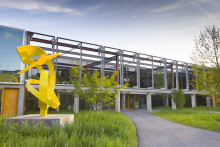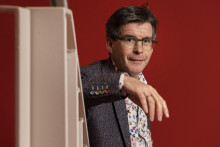The efficiency of UT education has been under scrutiny for some time now and is one of the financial measures to make the UT healthier. Why is this necessary?
Veldkamp: 'Finances have come under more pressure; There are fewer and fewer students and the fee per student has also decreased. Then things start to get tight at some point. That is why it is important that we gain insight into the costs and benefits of each programme.'
Last November, there was an analysis: with an influx of sixty first-year students, a bachelor's program breaks even. Is such a quota going to become the requirement for programmes?
Veldkamp: 'No, that is certainly not the intention. What we are introducing is a mandatory budget per programme. If that financial insight is there, then the programmes can make agreements together with the faculty board and consciously manage them.'
Isn't that something an Executive Board wants to get involved in?
Veldkamp: 'No, we only look at the total offer in consultation with the faculty boards. We are not going to micromanage at the educational level, we want to stay far away from that. Moreover, programmes all have a certain individuality, which you also have to respect. An important effect that I hope to see is that programmes can learn from each other: where are the inefficiencies in their education?'
Bondarouk: 'Numbers shouldn’t be taking on a life of their own, but that numerical substantiation should create awareness among the study programme management. In the end, it's all about responsible ownership, that everyone involved can make informed decisions.'
‘Future-proof education’
Future-proofing UT education was introduced last year as one of the twenty so-called 'building blocks'; measures to make the UT financially healthier and more future-proof. With 'future-proof education', the UT hopes to save around 6 to 10 million euros with measures ranging from housing to educational support. Offering education more efficiently is an important intervention in this regard. Tanya Bondarouk, dean of the BMS faculty, is the so-called lead dean of the project.
Making education more efficient, doesn't that come at the expense of quality?
Bondarouk: 'The top priority is and remains to provide good quality education. That's what we're known for as a university and that's non-negotiable. Making our education future-proof is not a pure cost-cutting exercise. This project is in line with the educational vision introduced in 2023. But you also have to be realistic: you can only spend as much money as you have available.'
Veldkamp: 'It is indeed not saving for the sake of saving. The content of education is paramount. It's just that the focus used to be almost exclusively on quality, but now it's also more on quantity.'
Isn't it strange that there was no insight into what UT education costs and yields? Not to compare a university with a company, but a company also knows what the cost price of a product is and what the profit margin is, right?
Veldkamp: 'We can conclude that we didn't know. Previously, the money ended up in a big pile, so to speak, and distributed among faculties and programmes via an allocation model. The need to dive into it was much less present before the austerity pressure came.'
Bondarouk: 'Times have changed. You can't have five to seven years to implement such a change. Due to circumstances, this is now being sped up.'
What can you conclude so far about some – perhaps missed – efficiency gains?
Veldkamp: 'Inefficiency is certainly not in the provision of education. Exams, on the other hand, take a relatively long time.'
Bondarouk: 'There is no evidence that study results are linked to the number of exams. But that does not mean that you have to drastically cut the number of exams you offer as a study programme. It may be the case that cancelling one exam is a small effort with a big efficiency gain. But in other cases, a small change can cost a lot of energy. It is important that a study programme has a certain degree of control over this.'
Veldkamp: 'The major cost items are logically in the man-hours and the infrastructure. Especially with regard to the subject of work pressure, it is good to gain insight and discuss what hours are spent and whether that is desirable. That could help to relieve the workload. That is also an important effect that we have in mind with this.'
With the Twente Educational Model, the UT has a fairly (labour) intensive form of education. Does this movement herald the end of that?
Veldkamp: 'No, the core and content of it remains completely intact. The Twente Educational Model does move along with current developments. Take, for example, the recent amendment to the Education and Examination Regulations. Because test results remain valid indefinitely, it relieves the pressure on testing and corrects inefficiencies.'
Will there be consequences if a programme falls below a certain lower limit in terms of intake or other financial viability?
Veldkamp: 'It is up to a faculty board to make an integral assessment. Again, as an Executive Board, you shouldn't want to micromanage that. Such a decision by a faculty board is not only about black or red figures, it is also about the question of which programme you want or have to offer. You can see it now with the phasing out of ATLAS. That is a decision that has been taken with pain in our hearts. The programme fits in perfectly with the profile of the university and the quality of the programme is beyond doubt. Yet you also have to look openly and honestly at the influx and draw your conclusions. But that always remains a very difficult decision to make. Moreover, stopping a course costs almost as much as starting a course.'
Bondarouk: 'Making our education future-proof is not just about cutting costs and the efficiency of study programmes. In this context, we are also committed to the further development of lifelong learning, also with a regional emphasis. And stabilizing the influx, for example.'
Veldkamp: 'Or repackaging existing courses or starting new ones. For example, EEMCS has concrete plans for an AI study programme and we would also like to offer a study programme from the Vrije Universiteit here in Twente soon.'
What still needs to be arranged before each programme has its own budget?
Veldkamp: 'Programme directors and controllers work together to budget the programmes, and they receive the necessary support. Next, it is also important to properly allocate the responsibilities of the programme directors, since they are given extra responsibilities. We then also have to look at whether we can harmonise educational support even better. Not everything is set in stone yet, but the ambition is to make a start on this next academic year.'






